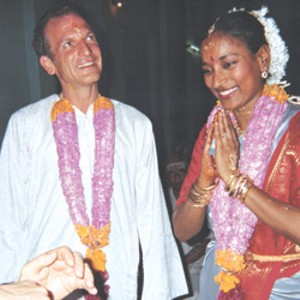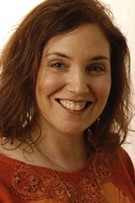Published February 2, 2011 at 11:23 a.m.
The marriage formula as most Westerners know it goes something like this: Two people meet — in class, at a party, online, whatever. If there’s a spark, they go on a date. That evolves into canoodling and cavorting, and soon both are drinking the Kool-Aid of romantic love. Somewhere along the line, they most likely sleep together. They may move in together. Eventually, one slips a ring on the other’s finger, and our couple sets off for the happily ever after.
Yet almost half the time, at least in the United States, those unions end in divorce. One partner may not really want kids after all, or resents putting career on the back burner. One likes to travel and socialize, while the other would rather nest at home. Big things such as values conspire with little, annoying habits to sour a love affair that once seemed rosy and limitless.
There’s a simple remedy to this dilemma, according to some traditionalists: arranged marriage. Those two words make most modern, Western couples cringe. But, for thousands of years and across many cultures, having one’s family arrange one’s betrothal was accepted practice.
How such an arrangement might come about — and thrive — in the 21st century is the crux of For Seven Lifetimes: An East-West Journey to a Spiritually Fulfilling and Sustainable Marriage, by Vatsala and Ehud Sperling. The book is an expansion of a volume first written by the couple 10 years ago.
Ehud Sperling, who looks a decade younger than his 61 years, is chief executive of the Rochester, Vt., publishing house Inner Traditions. He was recovering from a divorce 16 years ago when he realized he was no longer interested in what he calls the “test drives” of Western courtship and dating.
A dear friend, Inner Traditions author Harish Johari, suggested Ehud marry an Indian woman. “I thought, How am I going to do that? It was a departure for me,” says Ehud, who grew up in New York City. Yet, through a series of chance encounters and serendipitous events, he found himself placing an ad in the “matrimonials” section of Indian newspaper the Hindu.
B.R. Vatsala had been scanning those ads for five years. It was a Sunday ritual for families with females of marriageable age. Vatsala — whose family called her Mukta, meaning “liberated one” — was 34 and head of clinical microbiology at a children’s hospital near Madras, where she lived. Vatsala had eschewed early marriage to pursue a PhD and career. By the time she was ready to marry, her parents were elderly, and her brothers were busy with families of their own. Eminently practical and a believer in arranged marriage, she set about arranging her own.
Vatsala began replying to ads. Most of the time she got no response, but occasionally she received “very negative and insulting replies,” she writes. Vatsala learned to read the ads skillfully. “I could almost read the mind of the person … I could easily classify these advertisers as sex crazy, money crazy, figure crazy, color crazy, degree crazy, status crazy, culture crazy, hypocrite, slave driver, egomaniac, bride killer,” she recounts in the book.
One spring day in 1995, Ehud’s ad captured her attention. “I am the owner and Chief Executive of a successful International Book Publishing Company based in Vermount [sic], USA, seeking an alliance with an Indian girl with a view to immediate matrimony and parenthood…” Ehud went on to describe himself as Jewish, slim and handsome, and insisted that caste and religion were no bar. He offered his future bride “stability, status, international travel, financial security and commitment.”
Most importantly to Vatsala, Ehud promised freedom and support in maintaining her culture and religion. “That spoke to him as an individual,” says Vatsala, who found her best pen to write him a letter. She had a feeling that the ad “would take me where I belonged.”
Vatsala’s response was one of hundreds fielded by an acquaintance of Ehud’s who, due to the publisher’s distance, served as his marriage screener in India. The friend chose five women to recommend, including Vatsala.
She and Ehud traded 99 letters over the ensuing few months, probing every detail of the values they felt had to align to ensure a successful union: religion, spirituality, sex, parenthood, even their dos and don’ts of marriage. The markers are probably familiar to online daters: the letters, the awkward first phone conversation, the even more charged first meeting. In this case, Vatsala’s brother accompanied her and, at the end of the meeting, asked Ehud if he was ready to marry his sister.
“I will have to think on it and tell you tomorrow,” Ehud told him, which surprised but amused Vatsala. “If Ehud needed this extra 18 hours of time, he could have it,” she says. “I had lots of patience.”
On February 22, 1996, a little less than a year since they had begun to correspond, Ehud and Vatsala’s family and friends converged on a seaside town in Kerala for a clamorous, days-long wedding celebration. As is customary in India, the bride and groom promised themselves to each other for seven lifetimes. Their cross-cultural nuptials made Indian newspapers, along with the story of how they found each other.
A few days later, Ehud brought his new wife back to his mountainside home in Rochester, where the snow, wooded terrain and small population initially disoriented a woman used to the bustle, noise and heat of her native Tamil Nadu. Ehud’s enormous dog Noogie took some getting used to, as well. The couple eventually settled into a comfortable life together and had a son, Mahar. This is where their first book, 1990’s Marriage Made in Heaven: A Love Story in Letters, ends.
Their templates for marriage can be found among those early letters. Ehud’s was “DO: Love, honor and obey your husband and accord him his rightful place as head of household. DON’T: Challenge, criticize or ridicule him. DO: Expect your husband to put you and family before his own interests. DON’T: Be demanding.” These meshed with Vatsala’s entreaty for “no crisscrossing, messing up of roles … in other words, the man does not try wearing a skirt and the woman does not try wearing trousers.”
Though many reviewed the book favorably, kickback against the couple’s story and the seemingly 1950s-era gender roles it promoted were sometimes fierce, especially from women. One reader wrote on Amazon.com: “[Ehud Sperling] has the undeserved good fortune to link up with Ms. Vatsala, and I feel richly sorry for this utterly wonderful lady. I can only hope after she gets fed up with his big shot, ‘alpha dog’ mentality, she can make a good life for herself in the U.S.”
A decade after their book’s first printing, the Sperlings decided to reissue the volume with an update. For them, the heart of For Seven Lifetimes is the idea of marriage based on shared values and a platform for spiritual growth. It was important for Ehud to be open with Vatsala about his dominant nature prior to marrying. “As a publisher, I am used to being obeyed,” he says now. With salt-and-pepper hair crowning an intense, hawkish face, Ehud exudes authority tempered by thoughtfulness. “I get the final say; it is not a democracy. What do I do in the relationship? I needed to know how [Vatsala] would deal with an alpha dog. How do we navigate this dynamic? Does Vatsala want a strong man?”
He believes the book’s advice sets the boundaries for the couple’s roles and suggests criticism is one of the worst marital toxins: “Do you want a guy who can make tough decisions? Then don’t chop a little bit of his penis off each day,” he says during an interview. During their courtship, Vatsala reacted to this attitude with signature dry humor: In letters, she began calling Ehud “Captain.”
“I thought, This is someone who can play the game of life,” he says.
In Vermont, Vatsala, 50, still wears a red bindi on her forehead and dresses in a traditional Indian sari topped with a dark blue blazer. Her gaze is unwavering, and she waits patiently to comment after her husband’s energetic answers. She points out that male power is sometimes an illusion, but a necessary one. “In our culture, a man would decide when a child will marry. It’s his right. But in practice, the women make all of the decisions,” she explains.
“Most of the time I don’t feel like I have to hold myself back,” Vatsala continues. “He expresses his views about something, and we come to an agreement together.”
In the 15 years since they married, Vatsala has published seven children’s books based on Indian mythology; she also runs a homeopathy practice in Rochester. Their son is 12, and Inner Traditions is healthy. The marriage, like any other, is not always easy — they call the tribulations of partnership “storms,” and navigating them requires what Ehud calls “Vitamin T: tolerance. In India,” he explains, “they [Indians] have a level of tolerance I’ve never seen [elsewhere] on Earth.”
For dating couples considering marriage, the Sperlings have some suggestions. “Start by investigating. Start by sharing your value system,” Ehud says, rather than jumping into bed or being swept up by the current of love.
Once a couple is married, the Sperlings’ advice is more succinct. “Keep your mouth shut,” he adds.
“Just shut up,” offers Vatsala almost cheerfully. Both, it seems, are referring to themselves.
Want to read it?
For Seven Lifetimes: An East-West Journey to a Spiritually Fulfilling and Sustainable Marriage by Vatsala and Ehud Sperling. Inner Traditions, 352 pages. $19.95. store.innertraditions.com.
More By This Author
Speaking of Bridal & Romance
-

Oh, Snapchat! Anna Post Talks Weddings and Social Media
Feb 5, 2014 -

Burlington International Airport Prepares to Send Couples Into the Wild Blue Yonder of Matrimony
Feb 5, 2014 -

Dining on Samples at a Wedding Show
Feb 5, 2014 -

Can Couples Get Closer Through Bodywork?
Feb 5, 2014 -

Looking Back on the Tough Path Toward Marriage Equality
Feb 5, 2014 - More »
Comments
Comments are closed.
From 2014-2020, Seven Days allowed readers to comment on all stories posted on our website. While we've appreciated the suggestions and insights, right now Seven Days is prioritizing our core mission — producing high-quality, responsible local journalism — over moderating online debates between readers.
To criticize, correct or praise our reporting, please send us a letter to the editor or send us a tip. We’ll check it out and report the results.
Online comments may return when we have better tech tools for managing them. Thanks for reading.















































